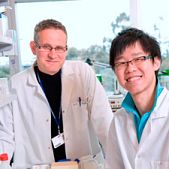
Greek Australian scientist who fights against obesity
Greek-Australian scientist and researcher Tony Tiganis may hold the key in the fight against obesity. Tiganis is a professor and Deputy Head (Research) of the Department of Biochemistry and Molecular Biology at Monash University. He is in charge of the Tiganis Laboratory which is a Cellullar signalling and human desease laboratory.
Tiganis and his team have been researching the connection between two naturally occurring hormones, which he says has given scientists new insights into how the brain regulates body fat.
The process conjured by Tiganis relates to leptin, a hormone produced by fat acting to suppress hunger and insulin, produced by the pancreas in response to the levels of glucose in the blood after a meal. Both of these hormones convey to the brain the amount of energy stored in the body and how much more is likely to be stored as a result of consumption. Once the energy levels are received by the brain the body converts white fat storage into brown fat (energy burn).
Tiganis has seen effective results in studies on mice to suggest that this process may actually be the cause of weight gain and obesity.
«We believe that one potential reason for why we may get fat is that this mechanism of energy balance is altered because the brain does not respond to insulin and lepton and does not effectively promote the conversion of white fat to brown fat. In mice we’ve been able to show that if we instruct the brain to convert white fat to brown fat, mice don’t put on weight when they are fed a high fat diet and are metabolically healthy» Tiganis told Neos Kosmos.
Whilst conclusive evidence is still years away, early signs of a “cure” are positive.
Prof. Tony Tiganis was educated at The University of Melbourne. He established an independent laboratory in the Department of Biochemistry and Molecular Biology, Monash University in 2000. He is Deputy Head (Research) of the Department of Biochemistry and Molecular Biology, Monash University and a NHMRC Principal Research Fellow. His general research interest is in understanding cellular signaling networks in human disease, with a specific focus on the roles of protein tyrosine phosphatases in metabolism, adaptive immunity and cancer.














Catherine Kerr
-16/10/2019 10:09 pm
Will you be starting human trials in the near future? And if so, are you currently looking for trial participants?
Catherine Kerr